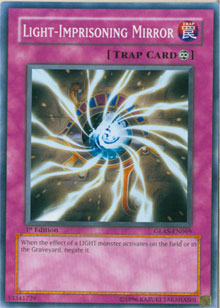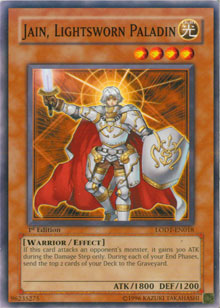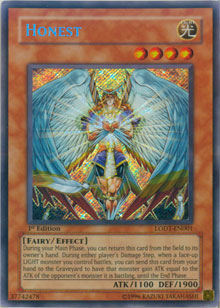 The Light and Shadow-Imprisoning Mirrors continue to show up in decks as a means of combating various light or dark themed decks popular in the metagame. The confusion surrounding how they work is recurring, so if you know any players that are new to these cards, have them read this article.
The Light and Shadow-Imprisoning Mirrors continue to show up in decks as a means of combating various light or dark themed decks popular in the metagame. The confusion surrounding how they work is recurring, so if you know any players that are new to these cards, have them read this article.
-Curtis
Light-Imprisoning Mirror and Shadow-Imprisoning Mirror are so good at confusing players, we should call them the "Player-Inhibiting Mirrors." The Mirrors were made to shut down the effects of Light and Dark monsters that activate on the field or in the graveyard. Recognizing which effects they will negate requires an understanding of where the effects activates.
We begin with the basics of the Mirrors.
Not a Skill Drain
It’s easy to want to associate the Light-Imprisoning Mirror and Shadow-Imprisoning Mirror with Skill Drain, because they do have some similarity, but this comparison is limited. Skill Drain is very picky about the status of the effect monster, while the Mirrors are more concerned about the attribute of the monster and where it activates its effect. As long as the effect activates on the field or in the graveyard, the Mirrors will negate the effect when it resolves.
The Mirrors don’t prevent effects from activating. They also don’t chain to the effect of the Dark or Light monster. The effect of the Dark or Light monster is negated when it resolves, wherever the monster happens to be at the time. The effect is still considered to have activated, so there aren’t any unfortunate "infinite loops" to worry about.
Example 1: Cannon Soldier Tributes Itself
Player A has Shadow-Imprisoning Mirror active in his spell and trap card zone. Player B activates Cannon Soldier’s effect, tributing the Cannon Soldier to activate its effect. When the effect resolves, it is negated by the Shadow-Imprisoning Mirror.
Example 2: Cannon Soldier Removed from Play
Player A has Shadow-Imprisoning Mirror and Macro Cosmos active in his spell and trap card zone. Player B activates Cannon Soldier’s effect, tributing the Cannon Soldier to activate its effect and also removing it from play. When the effect resolves, it is negated by the Shadow-Imprisoning Mirror even though it is in the removed zone, because its effect activated on the field.

Example 3: No Infinite Loop
The end phase effects of Light Spirit monsters are also negated in this way. The Spirit monster doesn’t try to return to its owner’s hand repeatedly. The Majestic Mech monsters will still try to destroy themselves in the end phase, but as long as Light-Imprisoning Mirror is active the effect will be negated when it resolves and the Majestic Mech will survive.
When the effect of a Dark or Light monster activates on the field or in the graveyard, you can chain Light-Imprisoning Mirror or Shadow-Imprisoning Mirror to the effect. (Not during the damage step, though) The Mirror will resolve first and apply its effects, so when the Dark or Light monster’s effect resolves it is negated.
Example:
Player A has Shadow-Imprisoning Mirror set in her spell and trap card zone. Player B special summons Gladiator Beast Gyzarus and activates its effect. Player A chains Shadow-Imprisoning Mirror. When the chain resolves, the Mirror resolves and becomes active, followed by Gyzarus whose effect is negated by the Mirror.
The continuous effects of Dark and Light monsters are not negated by either of the Mirrors, because continuous effects do not "activate." Skill Drain never had this problem, because it is capable of negating the continuous effects of monsters on the field. Keep this difference in mind when your opponent summons Jinzo, because Shadow-Imprisoning Mirror won’t help you here.
Where Do I Activate?
Both Mirrors are concerned with where the Dark or Light monster’s effect activates. The most common misunderstandings resulting from the use of the Light and Shadow Mirrors fall into this category. A player discards D.D. Crow and thinks its effect activates in the graveyard. Another player removes Destiny Hero – Malicious from play and thinks his effect activates in the removed zone. Neither player is correct.
To determine where the monster’s effect activates, you have to ask yourself where the monster is when you decide that you want to activate its effect or where it is when its effect is forced to activate. When I want to activate D.D. Crow’s effect, it is in my hand. When I want to activate Destiny Hero – Malicious’ effect, he is in my graveyard. D.D. Crow’s effect isn’t negated by Shadow-Imprisoning Mirror, while Malicious is negated by it.

Example 1:
Player A attacks Laquari with Lumina. During the damage calculation, he activates Honest’s effect, discarding it to pay the cost. Honest’s effect is not negated because its effect activates in Player A’s hand. Lumina gains 1800 ATK.
Example 2:
Player A has Cyber Valley in attack position. Player B has Big Piece Golem in attack position and Light-Imprisoning Mirror in her spell and trap card zone. Player B attacks Cyber Valley with Big Piece Golem. Player A activates Cyber Valley’s effect, removing it from play.
When Cyber Valley’s effect resolves it is negated, because Cyber Valley’s first effect activates on the field.
Monsters with trigger effects that activates when they move from one zone to another activate in the destination, and not where the monster was originally. A monster with text that says, "when this card is sent from the field to the graveyard," activates its effect in the graveyard. A monster that says, "when this card is summoned," activates its effect on the field.
Example:
Player A has Goldd, Wu-Lord of Dark World and Card Destruction in his hand. Player B has Shadow-Imprisoning Mirror active in his spell and trap card zone. Player A activates Card Destruction, discarding Goldd and drawing 1 card.
Goldd’s effect activates in the graveyard, starting a chain. When its effect resolves it is negated by the Shadow-Imprisoning Mirror.
Remembering where your Dark or Light monster activates its effect is the most important thing. When you understand this, you will know which monster effects will work and which will not. Also remember that the continuous effects of Dark and Light monsters won’t be negated.
Until next time, send all comments and questions to Curtis@Metagame.com
-Curtis Schultz